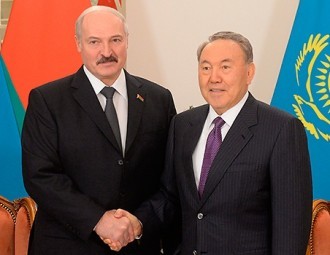Minsk and Astana try to strengthen coordination to offset Kremlin’s Eurasian integration initiatives

Despite some success, Minsk and Astana are unlikely to form a joint position to oppose Kremlin, as they have many conflicting interests and different levels of economic-political dependence on Moscow.
At a meeting in Astana last week, President Putin proposed to the presidents of Belarus and Kazakhstan to consider the creation of a monetary union in the future.
Only the presidents of Belarus, Russia and Kazakhstan participated in the Astana meeting – two other presidents of the EEU member states, Armenia and Kyrgyzstan, were not invited (Kyrgyzstan formally joins the EEU on May 29th, 2015). In addition, a bilateral meeting between presidents Lukashenka and Putin, which was announced earlier, did not take place. Most likely, the Kazakh president had called the meeting in Astana in the view of presidential elections in Kazakhstan and did not have any important decisions on the agenda.
Belarus continues to insist on the removal of internal barriers and limitations on movement of goods within the EEU. At the final press conference, President Lukashenka underscored the need to “fill the union’s domestic market with locally produced goods”. Specialists believe that the Belarusian economy would benefit the most from such measures and that Kazakh and Russian industries would not see any significant effects from them. President Lukashenka said that the next meeting would be held on May 8th in Moscow, “to discuss solutions to the issues that were discussed today”. In addition, President Lukashenka expressed support for President Nazarbaev in the ongoing presidential campaign in Kazakhstan: “You know what we think of you, you know that we worry and ache for you and wish you victory. I know that the Kazakh people treat you with the highest respect and warmth...”
Before President Putin’s arrival in Astana, Presidents Nazarbaev and Lukashenka held a bilateral meeting, during which they “discussed the state of affairs in the Eurasian integration in detail, the situation with sanctions, as well as the Ukrainian issue”. It is worth noting that the political relations between Belarus and Kazakhstan have been developing at a faster pace than economic cooperation. Kazakhstan occupies only 10th position in Belarus’ foreign trade with turnover at USD 1.2 billion. However, for both countries, Russia is the main trading partner and a market, where Belarusian and Kazakh producers often compete.
President Nazarbaev supported Mink’s initiative to develop a joint action plan to overcome recession in the EEU member states. He also said that issue had been a major topic for discussion during the trilateral meeting in Astana. Previously, the Belarusian authorities discussed the same issue with the Russian authorities in a bilateral format.
During the meeting, President Putin outlined his vision on the Eurasian integration in the coming years and underscored that the main task would be to introduce a single currency in the EEU: “We agreed with our partners to continue to coordinate monetary policy. We think the time has come to talk about the possibility of creating a monetary union in the long term. By working side by side, it would be easier to respond to external financial and economic threats, protect our joint market”.
Neither Kazakh, nor Belarusian president has publicly commented on the Putin’s proposal to create a monetary union. Moreover, both leaders had rather frosty response to the prospects for monetary integration in the next decade.
Minsk and Astana would continue to maintain bilateral contacts in order to contain the integration pressure from the Kremlin effectively. However, Belarus and Kazakhstan are unlikely pair up to elaborate alternative joint policy to reduce the Kremlin’s dominance in the EEU.
-
03.01
-
07.10
-
22.09
-
17.08
-
12.08
-
30.09








































